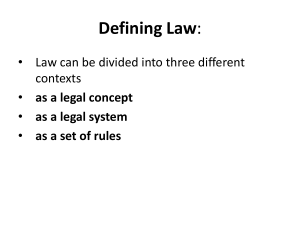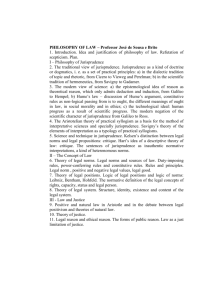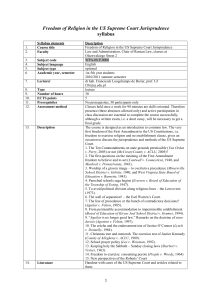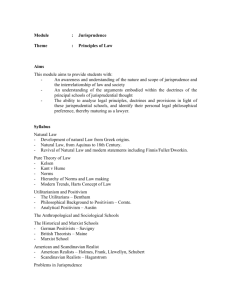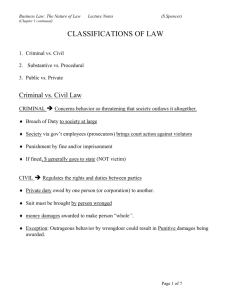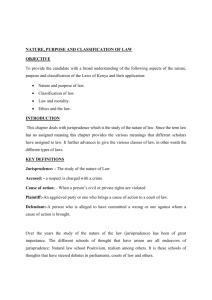Jurisprudence) for those that prefer pdf or doc
advertisement
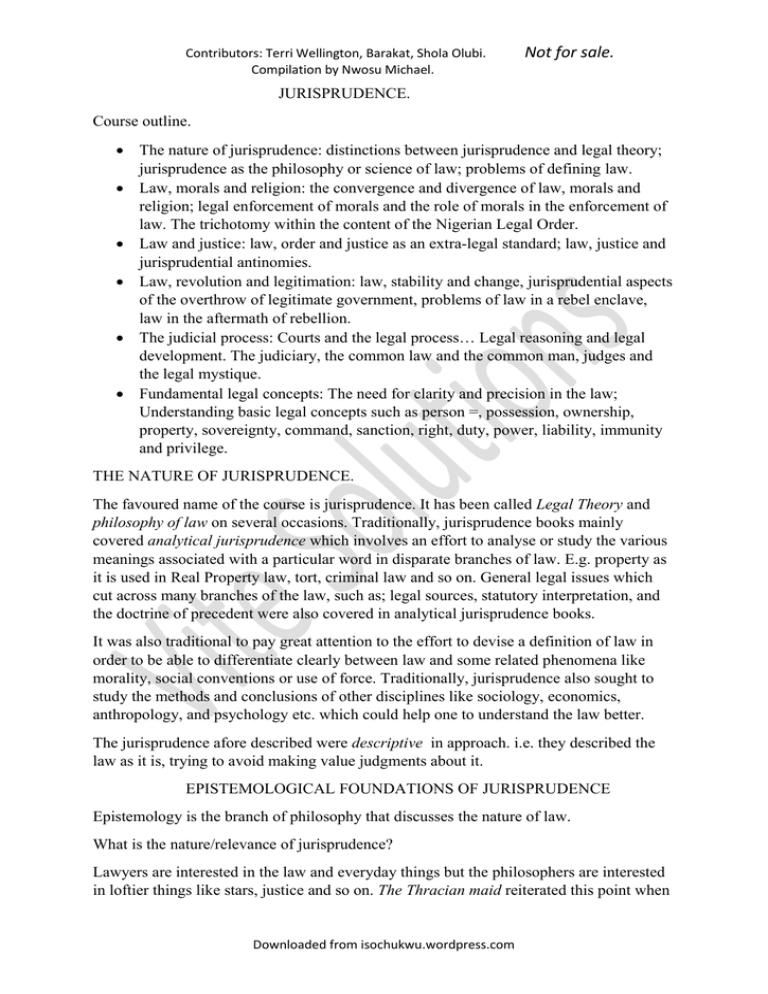
Contributors: Terri Wellington, Barakat, Shola Olubi. Compilation by Nwosu Michael. Not for sale. JURISPRUDENCE. Course outline. The nature of jurisprudence: distinctions between jurisprudence and legal theory; jurisprudence as the philosophy or science of law; problems of defining law. Law, morals and religion: the convergence and divergence of law, morals and religion; legal enforcement of morals and the role of morals in the enforcement of law. The trichotomy within the content of the Nigerian Legal Order. Law and justice: law, order and justice as an extra-legal standard; law, justice and jurisprudential antinomies. Law, revolution and legitimation: law, stability and change, jurisprudential aspects of the overthrow of legitimate government, problems of law in a rebel enclave, law in the aftermath of rebellion. The judicial process: Courts and the legal process… Legal reasoning and legal development. The judiciary, the common law and the common man, judges and the legal mystique. Fundamental legal concepts: The need for clarity and precision in the law; Understanding basic legal concepts such as person =, possession, ownership, property, sovereignty, command, sanction, right, duty, power, liability, immunity and privilege. THE NATURE OF JURISPRUDENCE. The favoured name of the course is jurisprudence. It has been called Legal Theory and philosophy of law on several occasions. Traditionally, jurisprudence books mainly covered analytical jurisprudence which involves an effort to analyse or study the various meanings associated with a particular word in disparate branches of law. E.g. property as it is used in Real Property law, tort, criminal law and so on. General legal issues which cut across many branches of the law, such as; legal sources, statutory interpretation, and the doctrine of precedent were also covered in analytical jurisprudence books. It was also traditional to pay great attention to the effort to devise a definition of law in order to be able to differentiate clearly between law and some related phenomena like morality, social conventions or use of force. Traditionally, jurisprudence also sought to study the methods and conclusions of other disciplines like sociology, economics, anthropology, and psychology etc. which could help one to understand the law better. The jurisprudence afore described were descriptive in approach. i.e. they described the law as it is, trying to avoid making value judgments about it. EPISTEMOLOGICAL FOUNDATIONS OF JURISPRUDENCE Epistemology is the branch of philosophy that discusses the nature of law. What is the nature/relevance of jurisprudence? Lawyers are interested in the law and everyday things but the philosophers are interested in loftier things like stars, justice and so on. The Thracian maid reiterated this point when Downloaded from isochukwu.wordpress.com Contributors: Terri Wellington, Barakat, Shola Olubi. Compilation by Nwosu Michael. Not for sale. she laughed at Thales who fell headlong while looking at the stars. Jurisprudence studies the law at a high level of abstraction. Jurisprudence leans heavily on what is good, just and right De Lege Lata/De lege Ferenda. This class is about the law as it is and the law as it ought to be (lex leta et lex ferenda) Jurisprudence equips us with the analytical tool for assessing the propriety of law. Jurisprudence deals with general theories of law and about law. It tries to synthesize the general and particular, the universal and specific, the abstract and the concrete. Not all lawyers are jurists but all jurists are lawyers. Jurisprudence is about the propriety of the law. Subsidiary legislations amplify the law. Judges don’t make laws, they discover it. Jurisprudence is about extrapolating the features of law universally. The basis of jurisprudence is “rationality”. What is “law”? what is “the law”? what should be the law? In most western societies, there is always a dichotomy between law and the law. Law is the glue that holds society together. Law regulates human conduct. JURISPRUDENCE: THE “PHILOSOPHY OF LAW” OR “THE SCIENCE OF THE LAW”? Jurisprudence borrows subjects/issues from philosophy. Philosophy is the mother of all disciplines. Philosophy is the peak of any one’s career. Hans Kelsen called jurisprudence the science of the law. Kelson was AustralianAmerican and he was a positivist. Jurisprudence is largely divided into two: - Positivism: what man posits. Natural law: laws could be off what man expressly posits. In Europe, jurisprudence is called philosophy of law. It is taught by lawyers and not philosophers. Jurisprudence studies law even though law is not a science. Science is established through the scientific process. The laws of science differs from the laws of man. The law of man regulates man while the law of science regulates both animate and inanimate objects via laboratory experiments. The law via experimentation leads to the sacrosanct formulation of theories. The law we study deals with consequences arising from violation. Can your act be captured within the rubric of the law? The law of science is descriptive while the law of human conduct is prescriptive. Lawyers deal with prescription…. Our law is prescriptive. Objective analysis forms the basis of the laws of science while human conduct forms the basis of the laws of man. Dean Roscoe Pound noted that lawyers are social engineers. He has argued that human law is also scientific because in analysing human behaviours, we use scientific techniques. Relationship between Jurisprudence and Philosophy. - Ethics is the branch of philosophy that deals with morality. Downloaded from isochukwu.wordpress.com Contributors: Terri Wellington, Barakat, Shola Olubi. Compilation by Nwosu Michael. - - Not for sale. Metaphysics and ontology is the philosophy of knowledge. The philosophy of being. Any elusive, complex or in any way mysterious ideas on which general agreement could not be explained in empirical terms. Aesthetics: beauty. Semantics: The art of speech. Truth. Value. Knowledge. 13th-01-2016. (The Nature of Jurisprudence Continues) Is jurisprudence part of humanities or is it a social science? Jurisprudence deals with knowledge about science- Empirically verifiable statements… THE IS V. OUGHT DICHOTOMY Science is interested in the “is” (factual statements subject to proof and empirically viable statements). Jurisprudence deals with the “ought” proposition. In jurisprudence there are sanctions for rules violated while none of such sanctions exists in the sciences. The law we study has a duality I.e. it is partly scientific (actus reus) and also psychological (mens rea). The objective and subjective factor plays a very large role in determining guilt for crime. Sanctions in law may include loss of freedom, loss of property and so on. In the sciences, acts contrary to its rules will lead to an accident- A natural consequence of a violation of the set rules. The subject matter of jurisprudence is prescription. i.e. mode of conduct. Jurisprudence is a normative science. A norm is a standard of conduct stipulated by law. Law has a close relationship with psychology. One has to be able to interrogate the properties of jurisprudence. Law without sanction is a misnomer and oxymoron. It is not the severity of sanctions that compels compliance but its certainty-Jeremy Bentham. Jurisprudence is both normative and empirical-George Benard Shaw-Every profession is a conspiracy against the laity-The Doctor’s Dilema. Law is a part of the social sciences because it goes into psychology, economics and sociology… and we deal in human conduct. The law zeroes in or focuses on the “ought” propositions. DOES JURISPRUDENCE FALL INTO THE HUMANITIES OR SOCIAL SCIENCES? There is a contestation as to whether jurisprudence falls into the humanities or social sciences. The philosophy aspect of it makes it berth within the waters of humanities. Note again that jurisprudence is normative and to a larger extent empirical. HOW WE PERCEIVE THE LAW Downloaded from isochukwu.wordpress.com Contributors: Terri Wellington, Barakat, Shola Olubi. Compilation by Nwosu Michael. Not for sale. The meaning of “meaning”. When we speak, we invoke words. The law according to Denning should be the uncommanded commander which are addressed to the people and they obey because of fear of sanctions/punishments. The un-commanded commander is the sovereign authority. According to Denning, the lawyer should have the gift of command of language. The garb of words only have meaning in the context in which they are used… Ordinarily, they mean nothing. Words are the form of expressing thought for understanding. There is a dialectical relationship between the utterer, symbol, referent and the utterance. UTTER AND UTTERS - Symbol-The words used. Referent- The person being spoken to. Utteree- The person who hears what is uttered. Lawyers use particular language when settling disputes. Lawyers understand the legal language. TYPES OF MEANING. Theological meaning: Theology is the branch of philosophy that looks at things in the context of their uses. E.g. a pen is a thing that writes. Would it still be a pen when it is not being used to write or when it stops writing? Therefore, theological meanings are useful. Just for describing functionality. Contextual Meaning: Words that can only be understood in the context in which they used. METHODS OF PERCEPTION Perception depends on the kind of thing perceived. There are symbols of language and the ideas of your mind. The symbols should convey the ideas of the mind transferring it to the mind of your audience. This is the theory of perception. 1. Nominalism: This means the giving of names to things. 2. Realism: A conceptualisation of a thing from the real thing itself. Realism is given (name… meaning) to a thing because of all its essential ingredients and characteristics. 3. Conceptualism: This gives rise to the theory of concepts. A concept is given to capture the essence of a particular phenomenon. This is the giving of label to things through the mind. 4. Instrumentalism: This is reminiscent teleology. Instrumentalism looks at a thing in terms of the functions it performs. Here, we look at the means in relation to the end it was machinated to achieve. THE CONCEPTIONS OF LAW. Downloaded from isochukwu.wordpress.com Contributors: Terri Wellington, Barakat, Shola Olubi. Compilation by Nwosu Michael. Not for sale. 1. The imperative conception of law: law as a command. Law is the command of the un-commanded commander which are addressed to the people and they obey because of fear of sanctions/punishments. The un-commanded commander is the sovereign authority. 2. The Institutional conception of law: this is the understanding of law vis à vis the institutions of the law like the courts, prisons, police, and so on. 3. The Ethical conception of law: Law is understood in relation to justice (reference here should be made to Plato’s Theateatus) Here justice is a template through which the law is appraised. 4. Law as a means of social Control: Dean Roscoe Pound noted that law is a mechanism for controlling society. The law has to be used to order the naturally unruly steps of the society. DEFINITIONS OF LAW Aristotle: law was “reason without desire”. To Cicero: law is the highest reason Implanted in nature which commands what ought to be done and forbids what ought not to be done. William Blackstone: Law is a rule of civic conduct prescribed by the supreme power in a state commanding what is right and prohibiting what is wrong. Prof Holland: Law is a general rule of external human action enforced by a sovereign political authority. Thomas Hobbes: Law properly is the word of him that by right hath command over others. Good Hart: law is any rule of human conduct which is recognized as being obligatory. Holmes (Oliver Wendell) The law is the prediction of what the courts will do. Karl Marx: the law is the will of the ruling class The definitions go on and on. Just note that in defining law, we have three approaches. - The nominal Approach. Conventional Approach. Real (essential) Approach. Prof Patterson in Men and Ideas of Law noted that since any definition of a term must use other terms and since any definition of those terms must use still other terms, any definition must consist ultimately of undefined terms. 18th January, 2016. THE ETHICAL FOUNDATION (ASPECTS OF LAW). Downloaded from isochukwu.wordpress.com Contributors: Terri Wellington, Barakat, Shola Olubi. Compilation by Nwosu Michael. Not for sale. Law is a normative category. It stipulates how people ought to behave. Moral is also a normative category. It stipulates how people ought to behave. It is believed that there should be a coincidence between law and morals. Law is interested in the “right” and the “wrong” of behaviour. Morals is interested in the “good” and “bad” of behaviours. What is good does not necessarily have to be right… on the other hand; that which is bad may not be illegal. Proper conduct is the essence of morality. Law sometimes approves conduct which the society may deprecate or put down. There is a disparity between law and morals. Law focuses on external conduct while morality is a matter of the mind or conscience. There are immoral things which the law does not frown upon like adultery in Nigeria, homosexuality in US. English philosophers of the utilitarian individualism believe in freewill and selfdeterminism. Morality plays a vital role in the utilitarian individualistic school. DIFFERENCES IN THE SCOPE OF LAW AND MORALS. Law is universal but morals are culture specific… geography-bound. Culture varies from place to place. Even within the same ethnic group. Female genital mutilation (circumcision) is acceptable in some places but unacceptable in some places. Culture is geographically limited. Morals are determined by the ethos or mores of society. Morality changes from time to time. i.e. it is time de-limited. IT depends on time and place. SANCTIONS FOR INFRACTIONS OF LAW AND MORALITY. For infractions of law we have: - Deprivation of rights and property. There is a set machinery for the enforcement of law. e.g. prisons, police, and so on. Enforcement of rules of law is in a public way. This point is epitomised by our security operatives. Law should be fixed, regular and constant to be predictable. For infractions of morality we have: - Shunning and ignoring the person who breaks the rules of morality. Ostracism Public opinion converges against you. If the rules of morality are wantonly broken, you must make amends to restore things back to status quo ante. Propriety is the center-point of morality. In contemporary Nigeria, morality is fast changing. Moral judgment = good and bad limitation. Legal judgment = Right and wrong limitation. Downloaded from isochukwu.wordpress.com Contributors: Terri Wellington, Barakat, Shola Olubi. Compilation by Nwosu Michael. Not for sale. It would be easier to enforce if an immoral act is also an illegal act. As was noted in Chapter 2 of Lon Fuller’s Law and Morality- For law to be law, it must be subsumed in morality. THE INNER MORALITY OF LAW: ANALYSIS OF LON L. FULLER’S THEORY. (the eight desiderata of law) Lon L. Fuller’s revolutionary legal philosophy identifies and explores what he describes as the inner morality of law. In his leading work, The Morality of Law (1964), fuller sets out a powerful and distinctive argument for law’s moral significance, contesting that there is no real conceptual distinction between law and morality by reason that the law is in its fullest sense, a moral commitment. He stresses that discussion of morality is simply inescapable if we want to completely understand the concept, including the main objectives of law. Fuller defines the law as a particular way of achieving social order by subjecting human conduct to the governance of rules. He believed that these rules and norms which are built into our legal procedures are intrinsically purposive and thus, value-laden and containing a procedural inner morality. In his theory, fuller sets out eight “principles of legality” which he argues are the necessary features of the “inner morality” which he identifies. He states that these essential conditions must be present to some degree in a legal system and the essence of this “must” is a moral one. 1. Generality: The law must be general for it to be acceptable. There should be no ad hominem legislation to catch a particular person. 2. Promulgation: is an essential requirement. This requirement urges that the law must be made public and not kept secret. This is in order for citizens to be made aware of the contents of the law because no one can be held accountable for something that they do not know about. 3. Rigidity and Constancy: law must not keep changing rapidly if it is to produce stable expectations of what is required of its citizens. But this does not mean that they cannot change in order to meet the changing needs of the society. According to fuller, rules must be as clear and concise as possible. For them to be understood and obeyed by everyone. Obscure or incoherent legislation can make legality unattainable. Albeit some interpretative leeway is inevitable and some flexibility desirable… rules that are deliberately unclear contradict the possibility of directing and governing human conduct according to them. 4. Flexibility: The law must not be oblivious to the necessity for change or reforms. Laws should however only be changed when necessary. 5. The law must be reasonable: The law should not command the impossible, unreasonable. Laws must provide rules that humans are capable of fulfilling unattainable. A law that people disobey has lost the essence of a law-Lon Fuller. 6. Duality: The law should bind both the lawmaker as well as the addressee. This is the duality of the law. Nobody should be above the law-Lord Denning. Lon fuller suggests that the law should be one that is capablt of enforcement. 7. Not Retroactive: They must be prospective and set out in advance. The basic human right of “no punishment without a law” supports this principle. Lon fuller Downloaded from isochukwu.wordpress.com Contributors: Terri Wellington, Barakat, Shola Olubi. Compilation by Nwosu Michael. Not for sale. noted that retroactive law is the brutal absurdity of the law commanding a man today to do something yesterday. Fuller however made it clear that tax laws are retroactively enforced-The Allegory of King Rex-Chapter 2 of Law and morality. Thus, a legal system made exclusively of retroactive rules would not make sense. However, there can be exceptions where the intended movement of the law is backward. In particular when irregularities are being remedied. 8. Congruence no to contradiction: between official action and declared rule. It is of utmost importance that what officials do must be in accordance with the law, otherwise, what the rules require and their application would differ in such a way as to leave citizens subject to the arbitrary power and will of those in authority. The law must not approbate and reprobate… it should not withhold what it has given. JURISTIC APPROACH TO MORALITY. 1. Positivists: posit that law and morals are two separate and distinct categories. In terms of regulating human conducts. 2. The Natural Law School: Laws and Morals intercept. The interception is reflective of similar and identical judgment. Law and morals continue… 20th Jan, 2016. Jimmy Carter’s Book on Law and Morals custodies bonos mores et decorus- also instructive in this regard is DPP v Shaw-the ladies directories case. It has been submitted that morality should be intertwined with the law. Law and morals are separate and distinct categories. They are normative but run pari pasu. Lon Fuller and his followers brought about a radical change. Note the Grudge Informal cases in Germany… Hitler, Reich, World War II and so on). In the grudge informal case, the women of Germany falsely testified against their husbands to practice prostitution? Read it up. - The jurisprudence of Jurisprudence. The conscientious objector. Conscientious objectors believe that there is a bigger weightier law of God which can inspire disobedience to the laws of man-Legality requires systematization. Some argue that since morality or moral consensus changes from time to time and place to place, it should not be a basis of the law. others argue that the criminal law of a society is a mirror into the moral sensibilities of that society. E.g. the law against rape protects the bodily integrity of women which morality also seeks to ensure. Note the case of Knott v Mohammed 1969 1QB 1. Mohammed married an under-aged girl and emigrated to the UK with his “wife”. When he was reported and a suit was filed against him, he was discharged and acquitted because the laws of England could not apply to a lawful act under Nigerian law. Note senator Yerima’s marriage to an Egyptian minor. Downloaded from isochukwu.wordpress.com Contributors: Terri Wellington, Barakat, Shola Olubi. Compilation by Nwosu Michael. Not for sale. Should an immoral law be valid? The argument here is whether a heinous and cruel law that obviously violates morals be valid. Thomas Aquinas believes that a law promulgated by man which violates the laws of God should be disobeyed. Moral laws are very powerful in a theocratic state (society). Theocratic states have the laws of God elevated above the laws of man. E.g. Saudi Arabia, Iran, some Northern States in Nigeria, and so on… the concept of morality forms the law in theocratic states. The Ayatollah, Onullahs, e.t.c are custodians of morality in Iran. Law is moral, metaphysical, idealistic and transcendental. Your concept of law flows from (and reflects your values. LAW, MORALS AND RELIGION. Law and Religion: Religion is the highest distillation of morality. Religion extrapolates morality. There are different codes of conduct known to various religions. Law can be an instrument of social change. What is purpose/utility of law? There could be values in the law and the law could be an instrument of social change. A law that encompasses the moral sensibility of society tends to be more effective-Dr Elias in The nature of African Customary law (1956) Chapter 5 (why are laws obeyed). R v Dudley and Stephens (1884) 14 QB 243. In this case, sea men found refuge in an uninhabited island and began to starve. They case lots to eat one of their members whom the lot fell upon. When they were charged, they pleaded that it was an act of necessity. They were absolved of their charge. LAW AND ENFORCEMENT OF MORALS. Morals are the leit motif (backdrop) for the law. The law must synchronise with morals. When the law reflects the prevalent morals in the society, that law tends to be more effective. Note: the colonial heritage of legal pluralism. Morality can be found in law like areas of tort, equity, contract like ex turpi causa non-oritur action, Rylands v Fletcher, Donoghue v Stephenson, fairness and justice, Obscene Publications Act, Firearms Act and so on 25th January, 2016. Jurisprudence and Legal Theory Cont… LAW AND JUSTICE. Is a philosophical question that has no answer… questions like what is law, what is justice? In answering this question, you give the definitions of various law from various philosophers and schools. What is your Definition of law? John Austin: said law is the command of the sovereign and is obeyed due to fear of sanction. He also defined law as the rule laid down for the guidance of an intelligent Downloaded from isochukwu.wordpress.com Contributors: Terri Wellington, Barakat, Shola Olubi. Compilation by Nwosu Michael. Not for sale. being by an intelligent being having power over him…. Laws are commands issued by the un-commanded commander. Such commands are enforceable by sanctions and the sovereign is one who is obeyed by the majority. HLA Hart in The Concept of Law criticised Austin’s view. In relation to the “sanction” aspect. He defined it as a system of rules… a union of primary and secondary rules… The primary rule governs conduct and the secondary rules … What about the Utilitarian view? The greatest happiness principle. The question is: is this possible? E.g. tax laws… Jeremy Bentham’s view of the law…. What of Karl Marx? What does he say about the law… The Marxists opine that law is will of the ruling class. As a tool of oppression… Plato, Aristotle, St. Thomas Aquinas, etc. saw natural law as an embodiment of reason. Another view of the law is that propounded by Oliver Wendell Holmes who sees the law as what the courts would do. The prophesy of what the courts would do. Another scholar looked at it as what officials would do in the settlement of dispute. Thomas Hobbes has noted that life is brutish and nasty… law is the common glue that holds society together. The question to ask then is: is law dependent on your culture? Partially. E.g. the Same Sex Marriage Prohibition Act. What is your opinion. Sometimes, culture is not the best arbitral of what is good or bad. You must note the definitions of Law, Order and Justice from the different Philosophers. 2. Examine the schools of thought and philosophies that underpin the concept. 3. Does law have any relation to justice/vice versa. Attempt 4 examples of justice as an extra-legal standard (going beyond the law). 5. Critique jurisprudential antinomies. 6. Are there any inherent contradictions between law and justice? If so, what are they? Can they be resolved? 7. Do you agree/disagree with any of the philosophers? Note: please give 3 or four Nigerian/African illustration where relevant to showcase your understanding. Food for thought - Is justice without law possible and vice versa. Can we have justice without law? can we have law without justice. Law or justice, which is superior? Which would you rather have? Is it possible to achieve a perfectly just society through law? You must be able to illustrate your points with examples. 27th January, 2016. JUSTICE. Justice is an ideal form of inter-personal relationship expressed in various forms like right to life, liberty, fair hearing, and so on… Downloaded from isochukwu.wordpress.com Contributors: Terri Wellington, Barakat, Shola Olubi. Compilation by Nwosu Michael. Not for sale. Justice is expressed in terminologies like equality… Kant says that justice requires every action to be in accordance with a universal principle. Jeremy Bentham observed that justice consists of the greatest good for the greatest number. Justice is of two kinds: - Natural/moral justice. Legal justice. The former represents the ideal while the latter seeks to fulfil that ideal. The relationship between law and justice. The first point on this is: Achieving justice in distribution of societal advantages and disadvantages. Two people may not have similar notions of justice. A person born into Dangote family and the other, a Makoko boy… do they have similar notions of justice? If they steal, and are charged to court, can they achieve justice equally? Number two achieving justice by ensuring liberty and curbing abuse of power. An example of this is habeas corpus. This came about to prevent oppression of the state and ensure liberty. Third relationship is achieving justice in deciding disputes: we are lawyers in the temple of justice, we should be ethical and ensure we defend our clients to the best of our ability. Would you Fourth is achieving justice in adapting to change… utilizing law as an instrument to drive social transformation. E.g. free education law. Law would still depend on the social context. A civil society would differ from a commercial society. What a person regards as justice may not be the reality. Natural Justice is justice revealed by divine reasoning implemented in the human mind. Legal justice is when the state finds portions of natural justice so important that their observance cannot be left to the option and good sense of an individual, then it gets formulated in form of legal rules. The justice dispensed by the law in accordance with these legal rules is legal justice. Hobbes has stated that no law can be unjust. This position has been criticised. What is your opinion? The class looked at the propriety of Anti-gay laws. Form your opinion. FUNCTIONS OF THE STATES. One essential function of the state is the administration of justice. In every modern state, these judicial functions are entrusted to the court. Courts of justice are also courts of law. Justice has to be rendered according to the law. According to Salmond “the law is without doubt, a remedy for great evils, yet it brings with it evils of its own”. This means that the law can be good and evil. This phrase should be considered in light of natural justice and Downloaded from isochukwu.wordpress.com Contributors: Terri Wellington, Barakat, Shola Olubi. Compilation by Nwosu Michael. Not for sale. legal justice. Why do you look for instances where the law is evil/bad. You can make example with the old laws like segregation laws, slavery laws, (death camp)… 1st February, 2016. LAW AND JUSTICE Where do you draw the line between land and religion? Law and Religion which is important? Considering the fact that the law UPDATE THE NOTE… ABOUT 12 lines which dealt with advantages of legal justice. ADVANTAGES OF LEGAL JUSTICE. According to Sir John Salmond, the administration of law according to fixed principles of law secures 3 advantages. - - The legal system ensures uniformity and certainty in the administration of justice. Law is a guarantee of impartiality in the administration to justice. If judges rule according to their instinct, then they may be influenced by improper motives. But if law exists then the public can observe departure from the rule of law and ask to correct the mischief. Man’s reason is too fallible a guide to achieve the principles of justice. This is because the rules of law represent the collective views of the community… The judge utilizing the “collective Community” embodied in the law is more likely to achieve sound connections, unlike if he had to rely on his own sense of right and wrong. In essence, law achieves uniformity, certainty and impartiality What is your position on gay marriage. What is your observation on a registrar who refuses to grant gay marriage? Defects of the Legal System - - Rigidity: the failure of the law to conform to the requirement of unforeseen cases. Society is complex and it is not possible to frame a legal rule to govern any eventuality. E.g. the recent Kogi State Election matter… when the constitution was written, we did not make detailed provisions for where a person dies after winning but before he is declared by INEC. The law reports are usually knock outs on technicalities… there is barely an analysis of legal rules and principles… preliminary objection… This means that the application of the law may sometimes cause hardship and injustice. However hard this may be, the law must be given effect to. “Hard cases should not make bad law” is the maxim by which judges are guided. The law allows you to appeal. Conservatism: Society progresses and this is reflected in the changing outlook of men… the law has to take account of these changes in the society’s view of justice. E.g in the US (the land of liberty), segregation laws were acceptable. Today, such views have been rejected by the same courts that would have vigorously enforced it. Brown v Board of Education. There are some customs we Downloaded from isochukwu.wordpress.com Contributors: Terri Wellington, Barakat, Shola Olubi. Compilation by Nwosu Michael. - - Not for sale. find in Nigeria where women are to drink the water of the corpse of the husband? There were various witchcraft laws of England. Read the Salen Witch trial cases of the US, in 19th Century. Our people are very superstitious… this affects the way our laws are framed/formed. The distemper of conservatism hence the truism that law is much behind public opinion, as public opinion itself is behind our ideal of justice. Formalism/technicality: due to a fixed legal system, the judge is apt to attach legal significance to legal technicality… A significance they do not deserve. This is particularly the case in Nigeria where the “preliminary objection” is the favoured weapon that requires resolution by the Supreme Court ensuring that cases take a long number of years and are not resolved. In one case, an attempt to disposes the tenant was heard by the Supreme Court after about 14 years… the landlord had died in the process of litigation. E.g. the Al Mustapha’s case where he spent over 10 years in jail and was never convicted. Needless Complexity: is the feature of the modern legal system. This is due as much to a complex modern society and civilization as notoriously crafty/suttle legal mind. These days, codification helps to minimise this problem. ANTINOMIES It is a mutual incompatibility, real or apparent of two laws, principles or conclusions. Basically an authoritative contradiction. Consider this statement: “there is no absolute truth”. The statement can be regarded as an antinomy as it purports to be a truth but in its content, denies the existence of any absolute truth. Also: the phrase “this sentence is false” for the sentence to be true it must be false and vice versa therefore it is an antinomy. Consider these three antinomies: - - - Laws are commands backed by power, force and compulsion any consideration of rightness or justice of these commands are irrelevant in determining whether a particular act/sovereign should be considered law. Law and morality should and must be viewed as existing separately thus the moral content of any statute ought not be relevant in determining whether the provision should count as/at law. This does not mean moral considerations should be excluded in law making only that we should not use the moral content of the statute in determining whether to identify that statute as a law. In determining whether a particular rule, command or principle should count as law, we should only consider its formal source. If it emanates from an officially sanctioned source e.g. legislature/judiciary/constitution… then it counts as law irrespective of its content. Even if it is wise or foolish, moral or immoral, it remains the law of the land. Read up Fundamental Legal Concepts HOFELD?. Law order and justice… get the material from the net… it talks about the command school… it is in pdf. The material shall also be sold in class. Downloaded from isochukwu.wordpress.com

